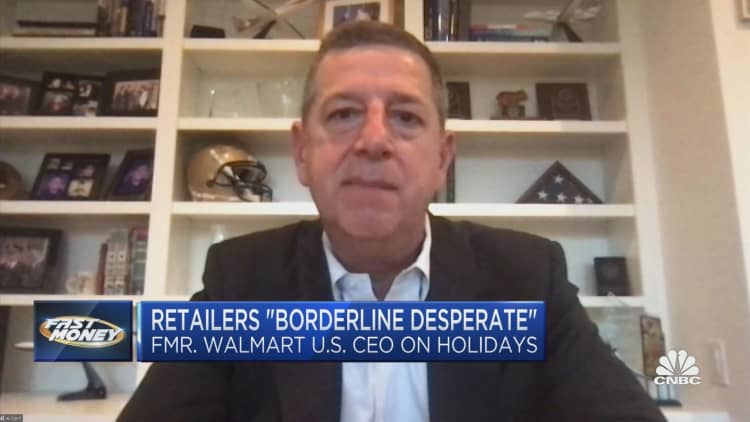Many shoppers say they plan to spend less this Black Friday as the cost-of-living crisis bites.
Richard Baker | In Pictures | Getty Images
Black Friday may offer an opportunity to bag a bargain ahead of the festive period, but many shoppers will be expecting retailers to cut prices by a greater margin this year as they tighten their belts amid a worsening cost-of-living crisis.
Shoppers in Europe plan to spend almost one-fifth less during this year’s annual discount period as inflationary pressures weigh on consumer sentiment, according to research from Boston Consulting Group this month.
U.K. consumers are set to cut back by the greatest margin in the region, spending 18% less, while those in France and Germany both plan to reduce their spend by 15% and Spain by 13%.
U.S. consumers were alone in the survey of nine nations, which also included Australia, in saying they expect to spend more this year, upping their expenditure by 6%.
Retailers under pressure
The findings come as the global economic outlook darkens, particularly in Europe, where Russia’s invasion of Ukraine has weighed on growth and sent energy prices rocketing.
The U.K. is already in a recession, the country’s independent Office for Budget Responsibility confirmed last week.
That is piling the pressure on retailers, already struggling to recover from a Covid-19 slowdown and attract increasingly cost-conscious consumers. Meantime, many companies, seeking to correct shortcomings and supply issues from last year, have built up vast inventories of stock that they are now under pressure to shift.
What we have seen is the Black Friday trend spread.
Kristy Morris
managing director of commercial solutions, Barclays Payments
“Black Friday is a vital moment in the shopping calendar for physical and online retailers still recovering from the Covid pandemic and now facing consumers in many markets who are reducing their spending plans for many non-essential items,” Jessica Distler, BCG managing director and partner, said in the report.
That could see retailers extend their discounts across the month, increasing buying opportunities for consumers who have the money to spend.
Rising risk of shopping scams
U.K. transactions rose 3.8% annually in the week leading up to Black Friday, according to new data from Barclays Payments, one of the country’s leading payment processors.
Kristy Morris, managing director of commercial solutions at Barclays Payments, told CNBC Thursday that could mean shoppers are more inclined to spread out their purchases over the Christmas season.
“What we have seen is the Black Friday trend spread. We’ve seen that spread across the week and actually even further into the month,” Morris said.
“Some of it is around potentially bringing forward some of that Christmas shopping and consumers thinking about being more savvy about how they might spend for Christmas,” she added.
Still, experts have urged shoppers to exert caution when seeking to take advantage of discounts this festive period.
John Davis, director for the U.K. and Ireland at cybersecurity organization Sans Institute, said that online hackers are known to “turn up the heat” during discount periods, particularly when shoppers are under pressure to clinch a deal.
Indeed, shopping scams rose by 34% following last year’s Black Friday and Cyber Monday weekend, according to Barclays research.
“Cybercriminals are levelling up with attacks that are more prevalent, more sophisticated and harder to detect than ever before,” he said.
Davis urged consumers to be extra vigilant when shopping online and avoid making rushed or panicked decisions out of “fear of missing out.”
“Opportunistic hackers will try to create a false sense of urgency, so it’s important to exercise caution by staying scam-aware, trusting gut instinct and building security into all of our online behavior,” he added.



